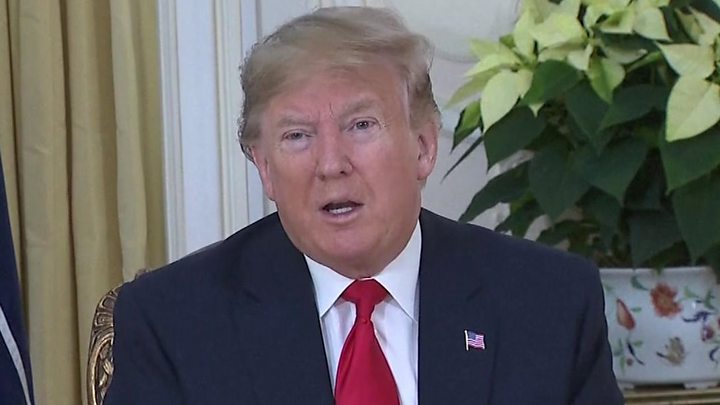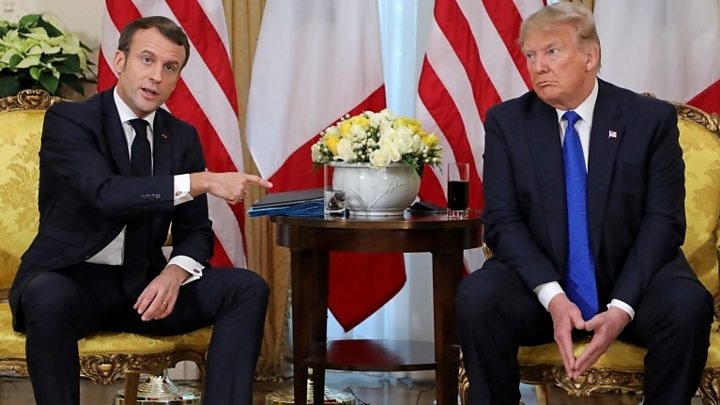
Media playback is unsupported on your device
US President Donald Trump has accused his French counterpart Emmanuel Macron of being “nasty” for saying Nato was “brain dead”.
Mr Trump is in London for a summit marking the Western military alliance’s 70th anniversary.
The US president said Nato served a great purpose, and Mr Macron’s remarks had been “very insulting”.
He also said he could see France “breaking off” from Nato, but did not explain why.
However, at a joint press conference with Mr Macron later, Mr Trump struck a warmer tone, stressing that the two countries had “done a lot of good things together as partners”.
Mr Macron said he knew his comments about Nato “shook up” a lot of people, but added that he stood by them.
Why is there a row over Nato?
Nato – the North Atlantic Treaty Organisation – was founded after World War Two to counter the threat of Soviet expansion. The 29 member states pledge to come to the aid of one another should any come under attack.
But speaking last month, Mr Macron complained that Nato members were no longer co-operating on key issues.
He described the alliance as “brain dead”, stressing what he saw as a waning commitment from its biggest guarantor – the US. He also criticised the US for not consulting Nato before pulling forces out of northern Syria.
The summit, due to get under way later on Tuesday, has already been overshadowed by a bitter row between member states France and Turkey, and a continuing debate over money.
Turkish President Recep Tayyip Erdogan has said he will oppose Nato’s plan for the defence of the Baltic region if it does not back Turkey over its fight against Kurdish groups it considers terrorists.
What did Trump say?
Earlier on Tuesday, at a news conference with Nato Secretary General Jens Stoltenberg, President Trump said Nato “serves a great purpose”, but was then asked what he thought about Mr Macron’s statements.
He said he thought the French leader had been “very disrespectful” to other alliance members.
“It is a very, very nasty statement. I think they have a very high unemployment rate in France. France is not doing well economically at all,” he said.
“It is a very tough statement to make when you have such difficulty in France when you look at what is going on. They have had a very rough year. You just can’t go around making statements like that about Nato. It is very disrespectful.”
France has an unemployment rate of about 8.5% – its lowest level in 10 years, although higher than the EU average of 6.3%.
Media playback is unsupported on your device
Mr Trump added: “Nobody needs Nato more than France… the US benefits the least. It’s a very dangerous statement for them to make.
“I’m looking at him [Mr Macron] and I’m saying that he needs protection more than anybody, and I see him breaking off [from Nato]. So I’m a little surprised at that.”
Mr Trump also reiterated his longstanding complaint that many other Nato countries were still not contributing enough financially.
Mr Stoltenberg praised Mr Trump’s “leadership on defence spending”, saying it was having a real impact.
“Since 2016, Canada and European allies have added $130bn more to the defence budget, and this number will increase to $400bn by 2024,” he said.

Media playback is unsupported on your device
“This is unprecedented, this is making Nato stronger, and it shows that this alliance is adapting, responding when the world is changing.”
President Trump welcomed the extra spending but singled out Germany as still falling short. According to Nato’s latest figures, Germany spends 1.36% of GDP on defence when the Nato guideline is 2%.
On a more positive note, he added: “The world has changed a lot and Nato is changing right now. I’ve become a bigger fan of Nato because they have become more flexible.”
He later added that he did not want countries to be “delinquent” and pay less than their share, adding “maybe I’ll deal with them from a trade standpoint”.
Why is Turkey an issue?
Mr Erdogan joined the dispute by suggesting that Mr Macron was the one who was “brain dead”, and accusing him of having “a sick and shallow understanding” of terrorism.
Last month, Mr Macron angered Turkey by hosting an official from the Kurdish-led Syrian Democratic Forces (SDF), key allies of the US-led coalition against the Islamic State (IS) group in Syria.
Turkey views a section of the group – the YPG – as terrorists.
Ahead of his departure for London, Mr Erdogan said Turkey would not approve a plan to defend Poland, Lithuania, Latvia and Estonia in the event of a Russian attack unless Nato recognised the Kurdish YPG militia as terrorists.
“If our friends at Nato don’t recognise as terrorist organisations those we consider terrorist organisations… we will stand against any step that will be taken there,” he said about the plan.
However, Mr Macron told reporters: “We don’t have the same definition of terrorism around the [Nato] table,” adding that the greatest priority was to fight IS.
In October, Turkey launched an operation in Kurdish-controlled areas of northern Syria to create a “security zone” along its border.
That military action deepened fractures between Turkey and other Nato members, and took place after President Trump had controversially pulled US forces out of the region.
Mr Macron and Mr Erdogan will come face to face in Downing Street on Tuesday in a four-way meeting also including German Chancellor Angela Merkel and the host, UK Prime Minister Boris Johnson.
A major problem for Nato
Turkey is posing a major and developing problem for Nato, a problem that if not resolved could test the very boundaries of its membership.
It is effectively holding hostage a response plan for the rapid reinforcement of the Baltic region – which must be approved by all 29 Nato members – until it gets what it wants in its own region.
Turkey wants all other Nato countries to regard Kurdish separatist groups in Turkey as terrorists. This would effectively take Nato into domestic security matters, which most allies see as none of their business.
Add to this Turkey’s unilateral actions in Syria; President Erdogan’s recent row with Emmanuel Macron over the Kurds; and Turkey’s purchase of a sophisticated Russian air defence system – an extraordinary step for a key Nato player – and you are well on the way to a full-blown crisis between Ankara and the alliance.
What is Nato?
- The North Atlantic Treaty Organisation is the world’s most powerful defence alliance
- It was set up in 1949, after World War Two, amid anxiety over Soviet expansion
- It was founded on the principle of collective defence between allies
- Originally had 12 members, but now has 29